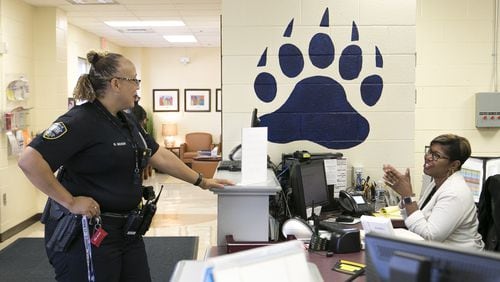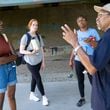President Donald Trump’s school safety commission on Tuesday released its report, saying the question of arming school teachers and other employees should be left to states and schools to decide.
It also called for a rollback of an Obama-era policy that was meant to curb racial disparities in school discipline but that critics say left schools afraid to take action against potentially dangerous students.
The panel, led by Education Secretary Betsy DeVos, laid out dozens of suggestions to improve safety in America’s schools. It is similar to Georgia House and Senate school safety study committees that convened this spring. Trump created the commission in March after a Parkland, Florida, school shooting that killed 17 students and staff members.
Georgia’s committees, tasked with proposing best practices that can become state law, call for a three-pronged focus on crisis prevention, physical security of buildings and buses; and emergency response. Their recommendations include updating a phone app that lets anonymous users send tips about suspicious activity or threats for law enforcement and school personnel to review, and increasing emergency drills in schools.
The chairman of Georgia’s Senate committee, John Albers, R-Roswell, said students’ mental health is a key aspect of crisis prevention.
That’s in line with the federal report, which covers areas ranging from mental health and cyberbullying to the regulation of guns and violent video games. .
“Our conclusions in this report do not impose one-size-fits-all solutions for everyone everywhere,” DeVos said in a call with reporters. “Local problems need local solutions. This report seeks to identify options that policymakers should explore.”
Among the chief federal proposals is a rollback of 2014 guidance urging schools not to suspend, expel or report students to police except in the most extreme cases.
President Barack Obama’s administration issued that guidance, urging “restorative justice” remedies that don’t remove students from the classroom, after finding that black students were more than three times more likely than whites to be suspended or expelled. The guidance warns that schools suspected of discrimination — even if it is unintentional — can face investigations and risk losing federal funding.
But the policy came under scrutiny after the Parkland shooting, with some conservatives suggesting it discouraged school officials from reporting the shooter’s past behavioral problems to police. Florida Republican Sen. Marco Rubio, one of the most vocal critics, urged DeVos to find a better balance between discipline and school safety.
The commission report says the policy was well-intentioned but “may have paradoxically contributed to making schools less safe.” It says disciplinary decisions should be left to school officials. It says the Justice Department should still investigate intentional discrimination but not the unintentional cases that are barred under the 2014 policy.
While the report doesn’t encourage schools to arm teachers or staff, it says they’re allowed to, and it points them to a Justice Department grant that can be used for training. Still, the group underscored that having a police officer who works in the school is the best option to respond to violence.
Among its other proposals, the commission urged states to adopt laws allowing “extreme risk protection orders,” court orders that temporarily restrict access to firearms for people who are found to pose risks to themselves or others.
The group recommended against raising the minimum age to buy a firearm, generally 18 in most states, saying there’s no evidence it would reduce killings.
The commission’s proposal was praised by some conservative groups but drew harsh criticism from some activist groups.
Dmitri Holtzman, director of education justice campaigns for the Center for Popular Democracy, said it sends “a clear message to millions of black, brown, immigrant, LGBTQ and transgender students that the federal government is turning its back on them instead of proactively protecting their fundamental rights.”
The nation’s largest teacher union doesn’t agree with the new proposal either.
“Instead of the Federal Commission on School Safety taking its charge seriously — addressing gun laws in this country and putting supports in place for students after the horrors of Parkland, Marshall County, Santa Fe and the countless other school shootings that have occurred this year — Betsy DeVos and the commission are doing the exact opposite,” said NEA President Lily Eskelsen García in a written statement. “The commission’s recommendations were decided in a vacuum without any real input from the real education experts — America’s teachers and school personnel working in public schools. We do not need more guns in schools. Students deserve real solutions that will keep them safe — that is what our students have asked of us.”
Along with DeVos, the safety commission includes leaders of the departments of Justice, Health and Human Services and Homeland Security. They issued their findings after more than a dozen meetings with teachers, parents, students, mental health experts, police and survivors of school shootings.
About the Author







